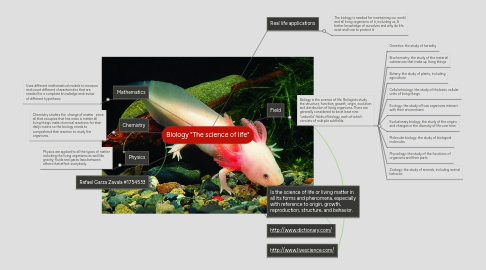Biology "The science of life"
by Rafael Garza


1. Real life applications
1.1. The biology is needed for maintaining our world and all living organisms of it, including us. A better knowledge of ourselves and why do life exist and how to protect it.
2. Physics
2.1. Physics are applied to all the types of matter including the living organisms as well like gravity, fluids and gases laws between others that affect everybody.
3. Chemistry
3.1. Chemistry studies the change of matter , since all that occupies that has mass is matter all living things make chemical reactions for their daily routine so the biology needs to comprehend that reaction to study the organisms.
4. Mathematics
4.1. Uses different mathematical models to measure and count different characteristics that are needed for a complete knowledge and review of different hypothesis.
5. Field
5.1. Biology is the science of life. Biologists study the structure, function, growth, origin, evolution and distribution of living organisms. There are generally considered to be at least nine “umbrella” fields of biology, each of which consists of multiple subfields.
5.1.1. Genetics: the study of heredity
5.1.2. Biochemistry: the study of the material substances that make up living things
5.1.3. Botany: the study of plants, including agriculture
5.1.4. Cellular biology: the study of the basic cellular units of living things
5.1.5. Ecology: the study of how organisms interact with their environment
5.1.6. Evolutionary biology: the study of the origins and changes in the diversity of life over time
5.1.7. Molecular biology: the study of biological molecules
5.1.8. Physiology: the study of the functions of organisms and their parts
5.1.9. Zoology: the study of animals, including animal behavior
